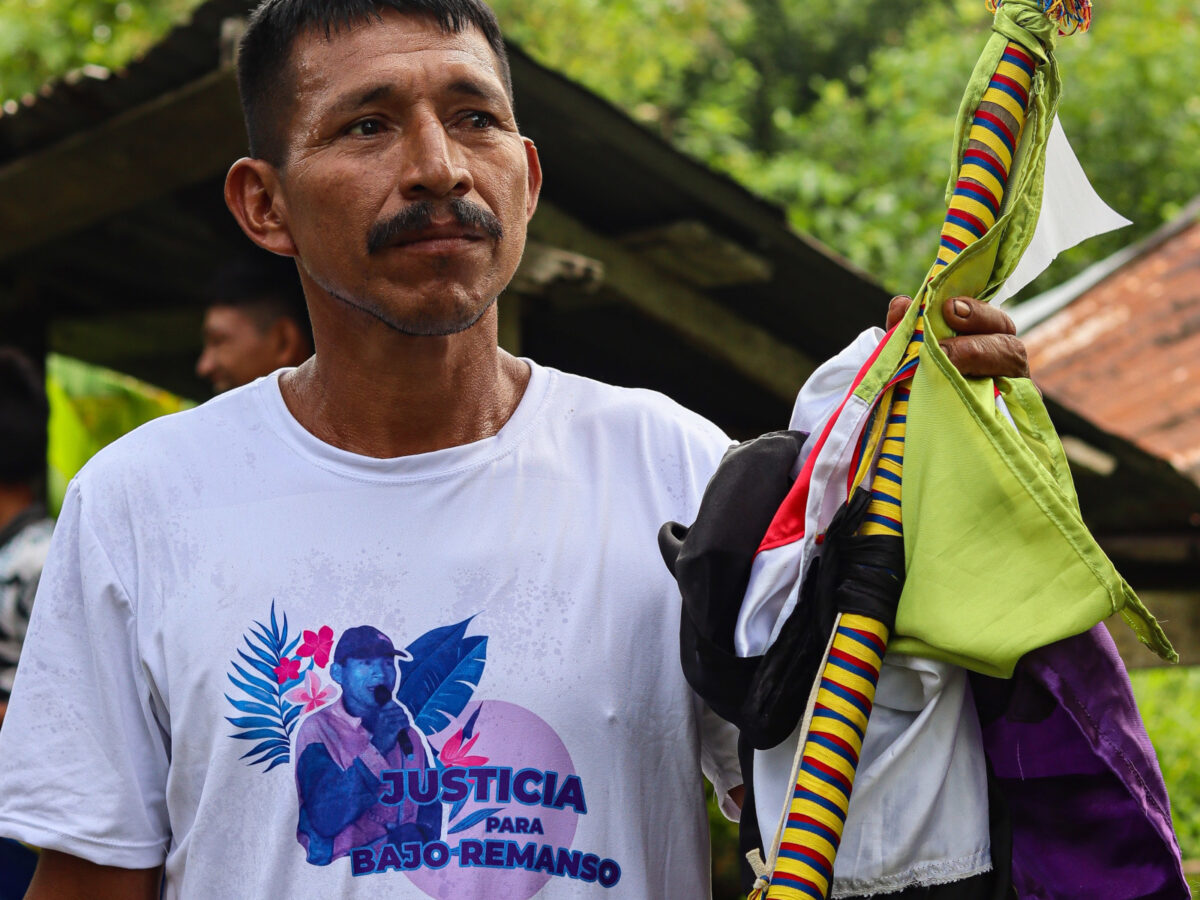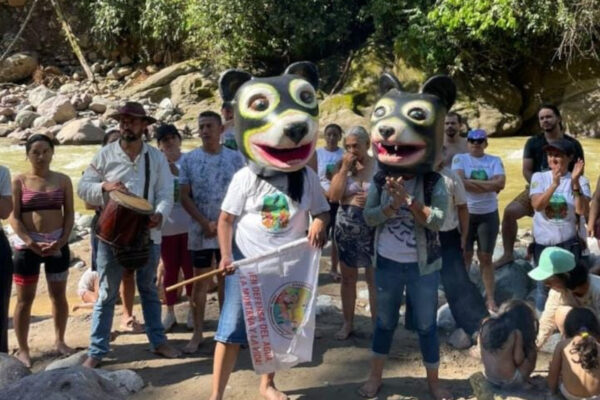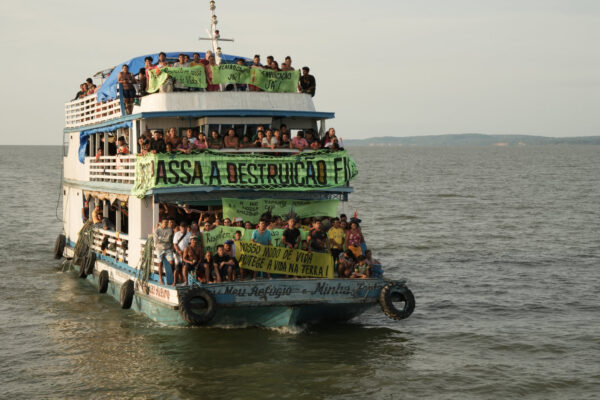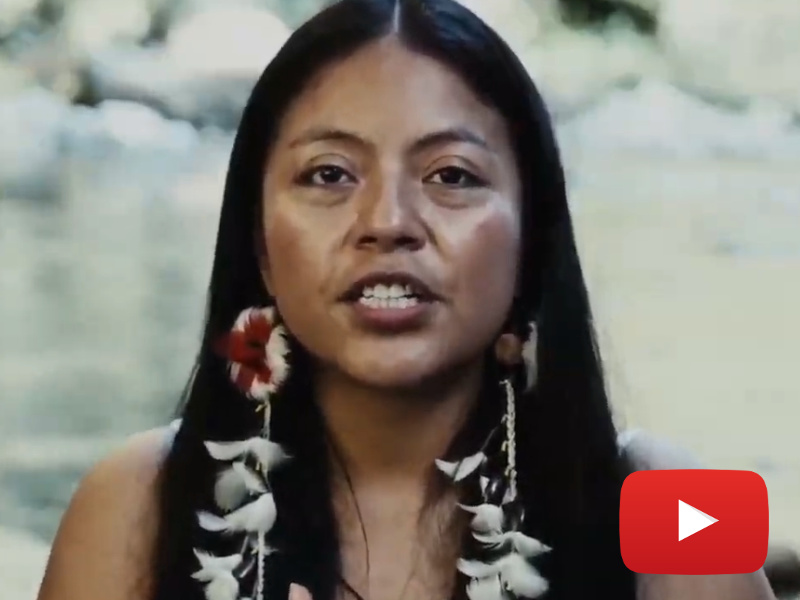Deep in the Colombian Amazon, the Indigenous community of Lower Remanso is fighting for truth, justice, and reparations. Two years ago, their leader, Pablo Panduro, was shot and killed as the Colombian army carried out an ill-fated operation to neutralize members of an illegal armed group. With Amazon Watch support, the community recently gathered to commemorate the second anniversary of the tragedy, strengthen bonds among the Kichwa people, and continue to speak out for their rights.
Yarley Ramirez, who stepped in as community governor in the aftermath of Panduro’s killing, will never forget that day. She could easily have been a victim herself had she not left a community fundraising event in Upper Remanso just hours earlier. Bursts of gunfire shattered the early Monday morning calm following a weekend of festivities. When the guns silenced, 11 people lay dead, with others injured. Colombian military officials immediately claimed on social media they had neutralized 11 members of the illegal paramilitary groups known as the Comandos de la Frontera.
The situation is fraught with grave injustices. Of the 11 people killed, at least four were civilians. The soldiers in the field and their superiors attempted to cover up what they had done, dressing up the bodies of murdered civilians with military gear to pass them off as “armed combatants” and then proudly announcing the action on social media.
The loss of Panduro has had a crippling effect on his community. For one, he played a number of key roles: leader on the community council, teacher of their Kichwa language, provider of traditional medicine, and organizer of sports activities. Additionally, Yarley reports that many community members have subsequently fled the region out of fear. Of the 37 families that previously lived in Lower Remanso, 17 have been displaced in the last two years.
In the face of this situation, Yarley and the community have been pushing the Colombian government to address three main demands. First, Lower Remanso demands for the truth to be told. The official record, which claims all those killed were members of an illegal armed group, must be corrected to reflect that Panduro and others were actually civilians. Who ordered the attack and why must be clarified, in addition to who attempted to cover up the massacre.
“For us, achieving truth would be to clarify what happened and who committed these crimes. Also, that the government ask for pardon from the public and that the name of governor Pablo Panduro be cleared. He wasn’t a guerrilla; he was an Indigenous and campesino leader.”
Second, Lower Remanso demands that justice be served. To date, the Attorney General’s office has indicted 25 soldiers who were at the scene, but the courts haven’t formally charged them. None of the implicated military commanders or the then Minister of Defense have been indicted, as they should given that they are the assumed intellectual authors of the massacre.
“The people who committed the crimes should pay, with the full weight of justice falling on them, because imagine how big all the impacts have been for us here in our territory.”
And third, Lower Remanso demands that the Colombian government provide adequate reparations, not only to the family members of the victims but the community as a whole. One key measure, which the community has been requesting for several decades, is the formal recognition of their Indigenous reservation.
“What we’re asking the government for is the legalization of our territory as a reservation because we have been struggling for this process for more than 20 years without a response. This would bring us security in our territory. In the community as we are now, the Colombian military can enter and not respect our internal rules and laws. Since we don’t have legal recognition of our territory, they can just walk over us.”
Addressing Colombia’s President Petro, the governor summed up their demands: “Our call to the president is that he should help us with collective and individual reparations, that he clarify what happened to our governor, and that the situation not continue in impunity.”
Amazon Watch support in coalition
Since the massacre, Amazon Watch has partnered with Colombian Indigenous federations and human rights groups to accompany the community of Lower Remanso and other victims. Through our Amazon Defenders Fund, we have provided financial support for a series of activities, including delegations to Bogotá and Washington, DC, and the second commemoration activities in Lower Remanso.
Additionally, we have been pressing the U.S. government about the case given its military support of the Colombian unit implicated in the massacre. Though U.S. law prohibits military support for units credibly alleged to have committed human rights violations, to date we have received no affirmative information that the 3rd counter-narcotics battalion has been placed on the State Department’s ineligible list. We will continue to join the community in demanding accountability for this atrocity.













